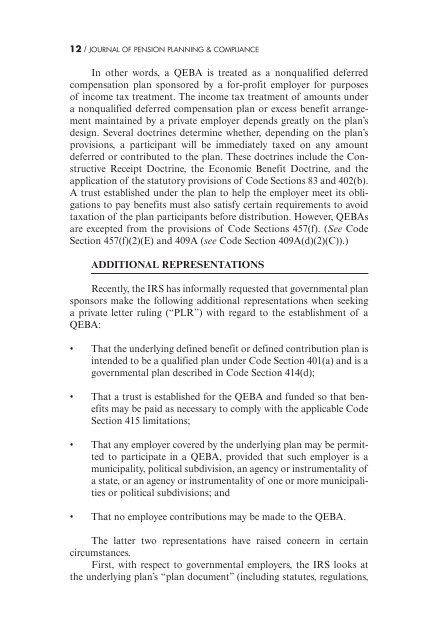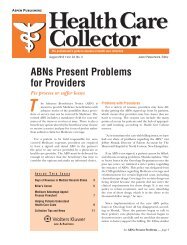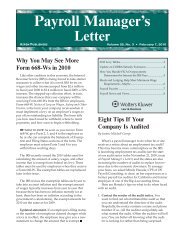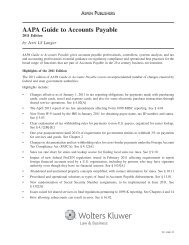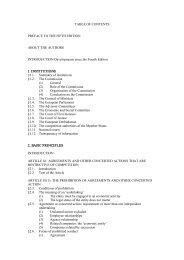journal of pension planning & compliance - Kluwer Law International
journal of pension planning & compliance - Kluwer Law International
journal of pension planning & compliance - Kluwer Law International
You also want an ePaper? Increase the reach of your titles
YUMPU automatically turns print PDFs into web optimized ePapers that Google loves.
12 / JOURNAL OF PENSION PLANNING & COMPLIANCE<br />
In other words, a QEBA is treated as a nonqualified deferred<br />
compensation plan sponsored by a for-pr<strong>of</strong>it employer for purposes<br />
<strong>of</strong> income tax treatment. The income tax treatment <strong>of</strong> amounts under<br />
a nonqualified deferred compensation plan or excess benefit arrangement<br />
maintained by a private employer depends greatly on the plan’s<br />
design. Several doctrines determine whether, depending on the plan’s<br />
provisions, a participant will be immediately taxed on any amount<br />
deferred or contributed to the plan. These doctrines include the Constructive<br />
Receipt Doctrine, the Economic Benefit Doctrine, and the<br />
application <strong>of</strong> the statutory provisions <strong>of</strong> Code Sections 83 and 402(b).<br />
A trust established under the plan to help the employer meet its obligations<br />
to pay benefits must also satisfy certain requirements to avoid<br />
taxation <strong>of</strong> the plan participants before distribution. However, QEBAs<br />
are excepted from the provisions <strong>of</strong> Code Sections 457(f). ( See Code<br />
Section 457(f)(2)(E) and 409A ( see Code Section 409A(d)(2)(C)).)<br />
ADDITIONAL REPRESENTATIONS<br />
Recently, the IRS has informally requested that governmental plan<br />
sponsors make the following additional representations when seeking<br />
a private letter ruling (“PLR”) with regard to the establishment <strong>of</strong> a<br />
QEBA:<br />
• That the underlying defined benefit or defined contribution plan is<br />
intended to be a qualified plan under Code Section 401(a) and is a<br />
governmental plan described in Code Section 414(d);<br />
• That a trust is established for the QEBA and funded so that benefits<br />
may be paid as necessary to comply with the applicable Code<br />
Section 415 limitations;<br />
• That any employer covered by the underlying plan may be permitted<br />
to participate in a QEBA, provided that such employer is a<br />
municipality, political subdivision, an agency or instrumentality <strong>of</strong><br />
a state, or an agency or instrumentality <strong>of</strong> one or more municipalities<br />
or political subdivisions; and<br />
• That no employee contributions may be made to the QEBA.<br />
The latter two representations have raised concern in certain<br />
circumstances.<br />
First, with respect to governmental employers, the IRS looks at<br />
the underlying plan’s “plan document” (including statutes, regulations,


